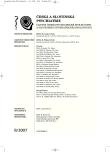-
Medical journals
- Career
Membranes: Etiopathogenic Substrate of Depressive Disorders
Authors: M. Anders; Z. Fišar
Authors‘ workplace: Psychiatrická klinika 1. LF UK a VFN, Praha přednosta prof. MUDr. J. Raboch, DrSc.
Published in: Čes. a slov. Psychiat., 103, 2007, No. 8, pp. 408-412.
Category: Comprehensive Reports
Overview
According to the membrane hypothesis of affective disorders, disturbances in lipid-protein interactions can be predisposing factor in depression. The hypothesis is based on well known fact that lipid-protein interactions affect functionality of most membrane integral proteins, including enzymes, receptors, transporters and ion channels ensuring transmembrane signal transduction. Moreover, changes in lipid-protein interactions induced by antidepressive drugs can be crucial step in molecular mechanism of their action.
Key words:
membranes, depressive disorder, serotonin transporter, antidepressants.
Labels
Addictology Paediatric psychiatry Psychiatry
Article was published inCzech and Slovak Psychiatry

2007 Issue 8-
All articles in this issue
- May the Images of Slim Female Figures Contribute to the Development of Eating Disorders?
- MEMBRANES IV: Specific Properties of Cell Membrane in Relation to Neuropsychic Disorders
- Membranes: Etiopathogenic Substrate of Depressive Disorders
- The Mechanism of Antidepressants Action on Cellular Membranes
- The Functions of Omega-3 and Omega-6 at Polynusaturatted Fatty Acids on Psychic Disorders
- Czech and Slovak Psychiatry
- Journal archive
- Current issue
- Online only
- About the journal
Most read in this issue- The Functions of Omega-3 and Omega-6 at Polynusaturatted Fatty Acids on Psychic Disorders
- May the Images of Slim Female Figures Contribute to the Development of Eating Disorders?
- MEMBRANES IV: Specific Properties of Cell Membrane in Relation to Neuropsychic Disorders
- The Mechanism of Antidepressants Action on Cellular Membranes
Login#ADS_BOTTOM_SCRIPTS#Forgotten passwordEnter the email address that you registered with. We will send you instructions on how to set a new password.
- Career

